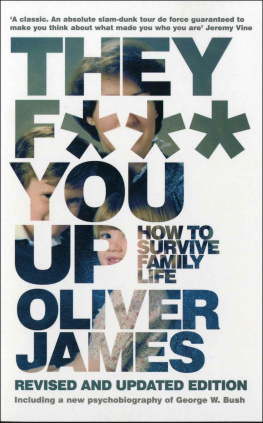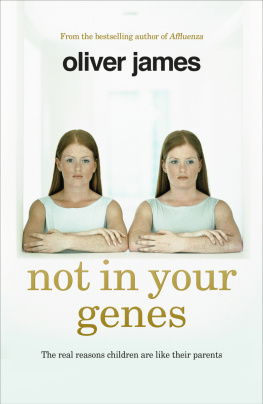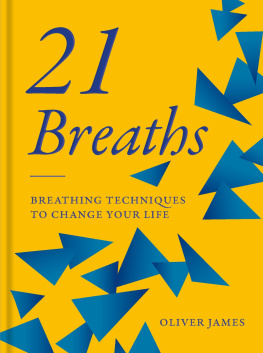THEY F *** YOU UP
How to Survive Family Life
Revised and Updated Edition
OLIVER JAMES

Contents
To my mum and dad,
the principal cause of this book
This Be the Verse
They fuck you up, your mum and dad.
They may not mean to, but they do.
They fill you with the faults they had
And add some extra just for you.
But they were fucked up in their turn
By fools in old-style hats and coats,
Who half the time were soppy-stern
And half at one anothers throats
Man hands on misery to man.
It deepens like a coastal shelf.
Get out as early as you can,
And dont have any kids yourself.
Philip Larkin
Short of marrying my wife and the two sparky nippers that have ensued from this union, it is one of the most gratifying events in my life (although not quite as pleasing as the two goals I scored in the inter-house cup final at school in 1972) that this book has been sufficiently widely purchased as to have justified a second edition because its subject is the one that has been closest to my heart for over thirty years. If readers have found it helpful, both in sorting themselves out and in becoming better equipped to do the business for their own children, then I am thrilled to have been able to promote these outcomes, surely the most important there are after the relief of starvation and medical illness.
A remarkable amount of new scientific evidence that strongly bears out the argument of this book has been published in the five years since the first edition in 2002, requiring a second one. In just that short period, the main proponents of genes for mental illnesses like schizophrenia or depression have wholly recanted their former position. Having pored through the genes identified by the Human Genome Project they have been forced to admit that it is extremely unlikely that there are any single genes for any mental illnesses. The new position is that it must be a question of clusters of genes. We shall see, but thus far there is little evidence for this theory.
Meanwhile, the overarching importance of parental care continues to find confirmation. One of the most convincing demonstrations is studies of its effect on patterns of brain electricity and chemistry, and even, on the very size of different bits of brain. For instance, it is becoming increasingly clear that early nurture sets the thermostat for our levels of cortisol or patterns of brainwaves in the left frontal lobe. It is also becoming clear that subsequent good experiences, like therapy, can reset the levels to healthier ones and that bad ones can do the opposite. One of the most significant scientific events of the century so far occurred this year when a whole volume of a highly respected psychiatric journal was devoted to the overwhelming evidence that schizophrenia is often caused by sexual and physical abuse. At least half of people given that diagnosis suffered this experience.
I do not remotely imagine that the readership this book achieved is purely due to its sparkling prose and brilliant insights. In the 1980s I was fortunate enough to become acquainted with Nic Roeg, the film director. Although he had been the creator of numerous outstanding films,Dont Look Now, the one starring Donald Sutherland and Julie Christie, was by far the most watched and commercially successful. In Nics view, it was no better than the others, it was purely a matter of luck that it happened to ring bells for people in the Developed world at that particular point in cultural history.
If this book had come out at the end of the 1980s, when genetic determinism was in its heyday, I doubt it would have chimed so well with the times. As I have argued in some detail in my latest book, Affluenza, it took the rise of what I have characterized as Selfish Capitalism (akin to market liberalism Thatcherism, Reaganomics) for Richard Dawkins book The Selfish Gene published in 1976 to become a bestseller, providing a rationale for Right Wing political beliefs. This book happened to coincide with a government which, at least in theory, regards the social environment as crucial, especially the role of parents. These things go in cycles. In my youth, in the Sixties and early Seventies, nurturism was all the rage, nature hardly got a look-in. The pendulum swung the other way in the Eighties, now it has swung back again. By 2002, I suspect that many people had become sick of hearing how their volition was largely illusory and that their genes were crucial.
However, the new openness to the importance of care in the early years was soon put to work in the service of Selfish Capitalism. Applying behaviourist theories, originally based on studies of reward and punishment in rats and monkeys, the likes of Gina Fords Contented Little Baby Book and Jo Frosts Channel Four series Supernanny became popular. The true title of Fords book should be The Contented Parent and of Frosts series, Taming the Beast in the Nursery. The needs of the parents are everything, the emotional needs of the small child are nowhere. Although there are countervailing popular alternatives, like the books of Steve Biddulph, and Jean Liedloffs The Continuum Concept, they were up against a government and national culture which was overwhelmingly concerned with parents working ever-longer hours in order to be able to afford ever more, bigger, consumer snacks, now. Blatcher and his Nouveau Labour acolytes proved perfidious not only in the matter of Weapons of Mass Destruction. It turned out that their personal lives were gruesomely dominated by a love of rubbing shoulders with celebrity (Blair), of chasing the sexually attractive (Blunkett, Prescott) and, worst of all, of chasing money (Cherie Blairs lecture tours and property investments) or associating with it (loans for peerages, hobnobbing with the rich).
Both their education and childcare policies reflected this rampant materialism, placing the creation of good little producer-consumers far ahead of the providing of the love and security which are so central to both real education and mental health. They wanted to addict future British children to their own Americanized values as much as possible.
In education, examination vied with university tuition fees as methods for locking children into a dog-eat-dog, commercially-driven existence. Playing fields continued to be flogged off as rapidly as they had been under the Tories, any curricula activity which would not directly contribute to the economy was downgraded or deleted and businessmen were allowed to buy academies in order to propagate a worrying mixture of Selfish Capitalist ideology and religion.
In childcare, just as hardly any of the Nouveau Labour elite or their partners actually cared for their babies and toddlers themselves, the downgrading of the maternal role (whether executed by a man or woman) proceeded apace, since only paid work attracted status. Notably, the SureStart scheme for poor parents was largely converted into group daycare provision on the grounds that only through paid work could mothers have self-esteem and dignity. It just so happened that such a policy also swells the available pool of low-paid workers to be hired by the companies contributing loans to Nouveau Labours campaign funds. Interestingly, little or none of the Nouveau Labour elite opted for group daycare as the method of substitute care for their own children, only one-on-one nannies would do for the likes of little Leo. Not a year went by without one or other of the Nouveau cabinet ministers seeking to mine political capital by announcing measures to crack down on parents and their feral children. Television screens were filled with out of control sink-estate children and parents being taught discipline. It has been desperately disappointing that the opportunities which arrived in 1997 have been squandered in these ways.












